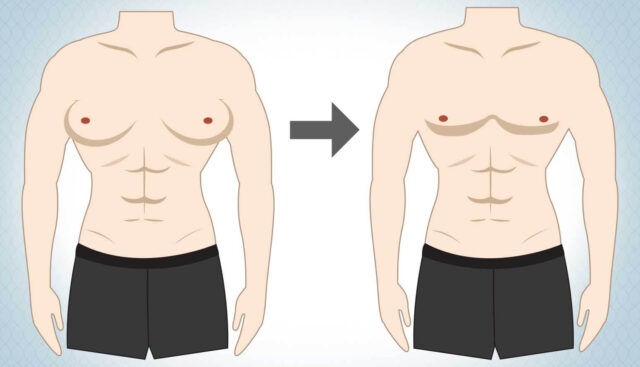
Gynecomastia is a condition where male breast tissues get swollen primarily due to hormonal imbalance. In most cases, men who are affected by gynecomastia suffer from social and psychological problems that can lead to anxiety and depression. Hence, they often choose surgery to get rid of the excess breast tissues.
To get proper treatment, it is important that you find the right doctor. So, if you are preparing yourself for consultation with a gynecomastia doctor, you need to know what to ask the doctor.
We have compiled a list of questions after consulting with an experienced doctor. The doctor suggested that it is essential to ask the following questions during your first consultation for gynecomastia.
10 Questions to Ask a Gynecomastia Doctor

Whether it is to learn more about the condition, the treatment options, or the doctor’s skills and experience, here are the most frequently asked questions during the first consultation.
What causes gynecomastia?
Gynecomastia is a medical condition that affects men all across the world. It is caused because of hormonal imbalance and makes breast tissues swell in males. Gynecomastia is also linked to certain medications and steroid use.
Can gynecomastia resolve with exercise or a balanced diet?

No. Gynecomastia usually doesn’t resolve without treatment, especially if there is an underlying condition, it will require specialized treatment, such as medication or surgery. The primary cause of gynecomastia is not chested fat that can be reduced by exercising or intermittent fasting. The body considers the excess tissue on the chest as normal. Therefore, it cannot be fixed through physical exercises or a balanced diet. Hence gynecomastia stays unaffected.
What are the treatment options for gynecomastia?
There are several treatment options available for gynecomastia, such as testosterone replacement, selective estrogen receptor modulator (SERM), medications like danazol, clomiphene, and surgical procedures. However, the non-surgical treatments are only effective in earlier stages of gynecomastia. If the condition has advanced, surgery is the most effective treatment method to reverse the effects of the condition. The liposuction method and excision method are used during the surgery where tiny incisions are made around the areola. Then the excess glandular tissues are extracted carefully. Surgery works as a permanent solution for gynecomastia as the hormones that cause the development of male breasts no longer exist in the body. That’s why most people opt for this method.
Am I eligible for gynecomastia surgery?

A person is considered eligible for gynecomastia surgery when he satisfies the following requirements:
- The breasts have already enlarged to the full size and the condition is stabilized.
- The person should maintain a healthy lifestyle and have an ideal body mass index (BMI).
- A person who neither smokes nor takes any kinds of drugs.
- A person who is not suffering from any health condition that can interfere with the recovery from the surgery or cause some kind of complications.
- A man who has realistic expectations from the surgery and hasn’t achieved any results from alternative treatment options.
What scarring should I expect from gynecomastia surgery?
Most people delay surgical treatment due to scarring, which is understandable. But the scars left after surgery depends on the approach used by the surgeon. The VASER (Vibration Amplification of Sound Energy at Resonance) approach is usually preferred by doctors as well as patients as it has several benefits and causes scarring around the areola which is hardly visible once the scar heals properly.
How long will it take to recover after gynecomastia surgery?

The healing tendency of the body varies from person to person. Hence, the exact recovery time will be different for each individual. Besides that, the recovery time also depends on the type of surgery. Whether you undergo VASER surgery or laser-assisted surgery, you will need 4 to 6 weeks to recover completely.
It is crucial that you do not rush during the recovery period and push your body to work or move as it can lead to complications. You can go back to work and perform regular activities after a week. But make sure that you don’t over exhaust yourself.
Are there any complications or risks of undergoing gynecomastia surgery?
Gynecomastia surgery is usually performed by expert surgeons, hence there are minimal chances of risks and complications. However, if the patient is not careful enough during the recovery phase, there can be post-surgery complications, such as hematoma, infection, persistent pain, fluid accumulation, changes in nipples, temporary breast sensation, etc. You can avoid these complications by following a healthy diet and taking all precautions suggested by the doctor.
What are the benefits of gynecomastia surgery?

Gynecomastia surgery has a number of benefits, such as:
- It gives a more masculine figure by removing the excess breast tissues, also known as man boobs.
- It allows men to regain confidence and self-esteem.
- Removal of excess tissues from the chest makes it easier for men to perform physical activities.
- Back pain that is common in gynecomastia is also resolved and the posture also improves.
Will gynecomastia return after surgery?
In most cases, the results of gynecomastia are long-lasting. However, the condition can return if you experience weight gain, hormonal changes, or start using steroids or drugs that increase the risk of gynecomastia. The doctor who will perform the surgery will also guide you properly to maintain the results.
Can you share the before-after photos of other patients?

A reputed and experienced doctor will be willing to share the before and after of other patients. In this way, you can get an idea of the aesthetic sense and skills of the surgeon and ultimately, decide if you want to get treated from them or not.
Takeaway
If you consider gynecomastia surgery as the best solution to get rid of the excess breast tissues, you can get in touch with Pristine Care doctors. They have a dedicated gynecology department consisting of experienced surgeons. You can book an appointment with them and explore your treatment options during consultation.
Don’t forget to ask the questions listed above during the consultation to clear all your doubts and concerns about gynecomastia treatment.












